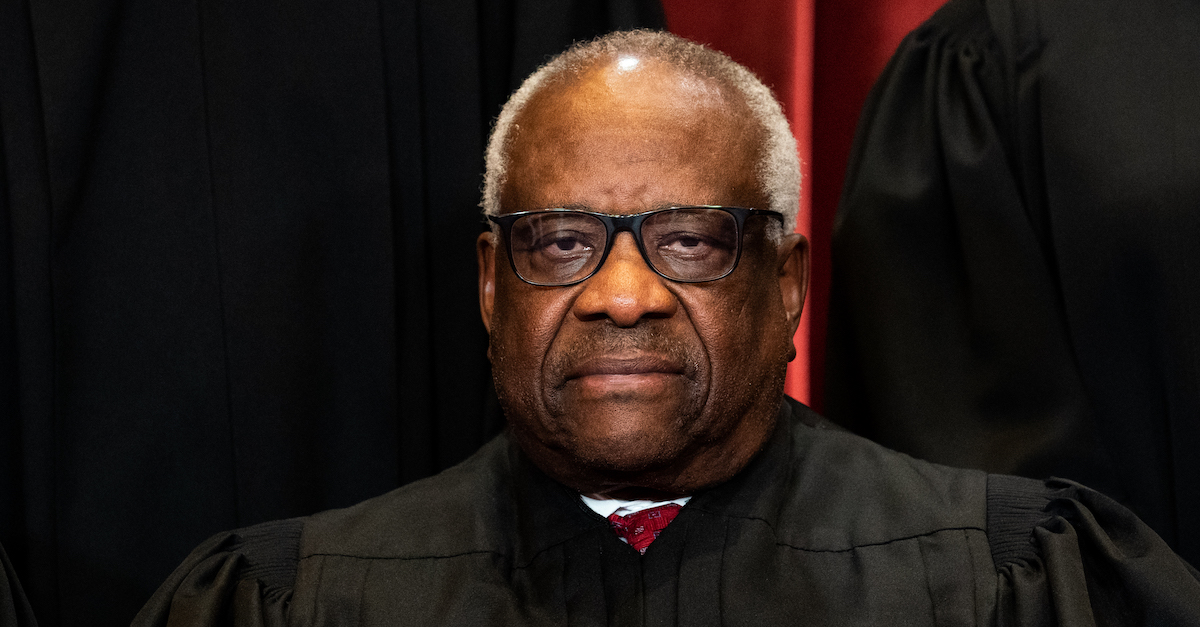
Associate Justice Clarence Thomas sits during a group photo of the Justices at the Supreme Court in Washington, D.C on April 23, 2021. (Photo by Erin Schaff/Pool/Getty Images.)
Justice Clarence Thomas stood apart from his fellow justices on Monday, again calling for the nation’s highest court to reconsider longstanding precedent regarding defamation lawsuits.
The case involves a lawsuit by Coral Ridge Ministries (CRM), an evangelical Christian organization and media company doing business as D. James Kennedy Ministries. CRM sued the Southern Poverty Law Center over the civil rights group’s designation of the Florida-based CRM as an anti-LGBTQ hate group, claiming defamation.
“Over the years, Kennedy emphasized anti-gay rhetoric, particularly in his TV ministry,” the SPLC’s website says of CRM. “He recommended as ‘essential’ the virulent work of R.J. Rushdoony … who believed practicing gays should be executed. In an especially nasty 1989 edition of a CRM newsletter, Kennedy ran photographs of children along with the tagline, ‘Sex With Children? Homosexuals Say Yes!'”
CRM has also hired Robert Knight, which the SPLC describes as an anti-gay activist, as a senior writer and Washington, D.C., correspondent. Knight has argued against allowing gay people to serve openly in the military, and had previously written that gay marriage “entices children to experiment with homosexuality” linked acceptance of gay people to “a loss of stability in communities, with a rise in crime, sexually transmitted diseases and other social pathologies,” as well as “a shortage of employable, stable people.”
When CRM applied in 2017 to receive donations through the AmazonSmile program, which allows Amazon shoppers to contribute to nonprofit organizations, the online mega-retailer denied the request, citing the SPLC’s designation of CRM as a hate group.
CRM sued in federal court. A district judge dismissed the claim on First Amendment grounds, finding that CRM did not sufficiently show that the SPLC had acted with “actual malice,” the standard of intent required in a defamation claim brought by a public figure, which CRM had conceded it was, for purposes of the lawsuit. The U.S. Court of Appeals for the 11th Circuit upheld that dismissal in July 2021.
“We hold that the district court was correct in finding that Coral Ridge’s interpretation of Title II would violate the First Amendment by essentially forcing Amazon to donate to organizations it does not support,” the three-judge panel — made up of circuit judges appointed by former presidents Gerald Ford, Bill Clinton, and Donald Trump — held at the time.
Coral Ridge appealed, and on Monday, the Supreme Court denied the organization’s certiorari request. Justice Thomas was the only justice to write a dissent.
After laying out a timeline of the case that was clearly sympathetic to CRM’s cause — remarking that “SPLC’s ‘hate group’ designation lumped Coral Ridge’s Christian ministry with groups like the Ku Klux Klan and Neo-Nazis” and concluding that the SPLC “caused Coral Ridge concrete financial injury by excluding it from the AmazonSmile donation program” — Thomas targeted the longstanding “actual malice” standard that a public-figure plaintiff must show in a defamation claim.
“I would grant certiorari in this case to revisit the ‘actual malice’ standard,” Thomas wrote. “This case is one of many showing how New York Times and its progeny have allowed media organizations and interest groups ‘to cast false aspersions on public figures with near impunity.'”
Thomas cited his own prior work — a 2021 dissent in the Supreme Court’s denial of certiorari in Berisha v. Lawson, another defamation case — as support.
“Coral Ridge now asks us to reconsider the ‘actual malice’ standard,” Thomas wrote. “As I have said previously, ‘we should.'”
The landmark Supreme Court decision in New York Times v. Sullivan, which set forth the requirements for proving defamation, and the Supreme Court’s decisions “expanding it,” Thomas wrote, “were policy-driven decisions masquerading as constitutional law.”
The Supreme Court justices, Thomas wrote, “have never even inquired whether ‘the First or Fourteenth Amendment, as originally understood, encompasses an actual-malice standard.'”
“Because the Court should not ‘insulate those who perpetrate lies from traditional remedies like libel suits’ unless ‘the First Amendment requires’ us to do so, I respectfully dissent from the denial of certiorari,” Thomas concluded, again citing himself in his dissent in Berisha.
Thomas had telegraphed this position since at least 2019, when he wrote a separate ruling in support of the Supreme Court’s denial of certiorari for Kathrine Mae McKee, who had accused Bill Cosby of defamation after suing the one-time comedian for allegedly raping her.
The spotlight of public criticism has shone brightly on Thomas in recent weeks, particularly in light of the separate opinion he wrote in Dobbs v. Jackson Women’s Health Organization, the Supreme Court ruling issued Friday that overturned the landmark 1973 Roe v. Wade decision that guaranteed American women access to abortion care.
In his dissent, Thomas indicated his desire for the Supreme Court to reconsider its rulings regarding rights to contraception, sexual activity, and same-sex marriage.
Ginni Thomas, the justice’s conservative activist wife, has also made headlines in connection with her support of conspiracy theories about the 2020 presidential election.
“DJK Ministries is thankful for the time and effort given to our case by the United States Supreme Court,” a representative from plaintiff CRM told Law&Crime in an email. “We are thankful for Justice Thomas’ thoughtful and detailed dissent, and we agree with his comments.”
Representatives from the SPLC didn’t immediately respond to Law&Crime’s request for comment.
Read Thomas’ dissent here:
Editor’s note: This story has been updated with comment from CRM.
[Image via Erin Schaff/Pool/Getty Images.]